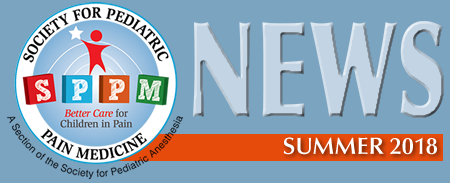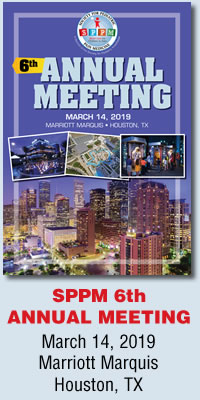Editor's Corner
Measuring the Pediatric Pain Measurements
 By Yuan-Chi Lin, MD, MPH, FAAP; Francis Kraemer, MD; Meredith R. Brooks, MD, MPH
By Yuan-Chi Lin, MD, MPH, FAAP; Francis Kraemer, MD; Meredith R. Brooks, MD, MPH
Pediatric pain clinicians need to provide patients with family-centered and individually planned pain management strategies. Pain measurement tools are important for providing pediatric pain related medical care. We commonly use them to assess the progress of illnesses. They can be used as an indicator of continuing analgesic usage.
Applying developmentally appropriate methods for assessing pain is a challenging task. We should try to use a validated pain assessment tool to assess pain conditions and to document the response to pain management. When we deliver care for fetal surgeries, fetal pain assessment requires us to explore new knowledge. We are very fortunate to have leaders in the field of pediatric pain medicine to provide us with the pain measurement tools in this issue of the SPPM Newsletter.
Nadja Reissland, D.Phil, MA, BSc, Cpsychol, Durham University; and Kanwaljeet J.S. Anand, MBBS, DPhil, FAAP, FCCM, FRCPCH, Stanford University, present an interesting article about the assessment of fetal pain. Linda A. Bulich, MD, FAAP, Boston Children’s Hospital, provides her valuable experience in the assessment and management of pain during fetal surgery and intervention. Pediatric pain assessment tools need to be tailored to individual needs. This is exceptionally difficult in the population of children who are non-verbal and developmentally delayed. Erin Sweet, RN, CFNP and Jean Solodiuk, RN, PhD, Boston Children’s Hospital, outline the pediatric pain assessment tools. Psychological pain assessment tools are essential in delivering pediatric care. Rachael Coakley, PhD, Director, Clinical Innovation and Outreach in Pain Medicine, Boston Children’s Hospital presents the psychological pain assessment tools. The information provided is essential for us to deliver sound patient care as to well conduct concrete scientific medical research.
Under the leadership of R. Scott Dingeman, MD, FAAP and Vidya Chidambaran, MD, we had a very successful SPPM 5th Annual Meeting in Phoenix, Arizona. The meeting focused on scientific updates and new challenges in pediatric acute pain, regional anesthesia, chronic pain, and palliative care medicine. This issue of the newsletter features an excellent review of the meeting. Michelle Kars, MD and Galaxy Li MD summarize the session of Science of Pain. Franklin Chiao, MD and Sophie Pestieau, MD provide a very nice analysis of the Acute Pain & Regional Anesthesia session, as well as a phenomenal pro/con debate about nitrous oxide for sedation by Stefan Friedrichsdorf, MD and Rosalie Tassone, MD. The SPPM 6th Annual Meeting is going to be held on March 14, 2019 at the Marriott Marquis in Houston, Texas. We hope to see you next year.
There were 48 scientific papers presented at the SPPM 5th Annual Meeting. SPPM members are engaging in high quality, cutting edge scientific research in pediatric pain medicine. In this newsletter we feature four award-winning papers: Petra Meier, MD, Boston Children’s Hospital, “Population Pharmacokinetics of Intraperitoneal Bupivacaine Using Atomization versus Nebulization and Opioid Requirements in Young Children”; Cornelius Groenewald, MD, Seattle Children’s Hospital, “ Associations between opioid prescribing patterns and opioid overdose among adolescents in the USA”; Sejal Virani, MD, University of Michigan, “A High Baseline Psycho-somatic Symptom Profile Predicts Persistent Pain at One Year Following Spine Fusion in Children”; and, Heather Goodly, MD, University of Michigan, “ Prediction of Early Severe Postoperative Pain in Pediatric Ambulatory Surgical Patients.” These new scientific discoveries will further elevate pediatric pain care to the next level of excellence.
Our recent issue of the SPPM Newsletter indicates that pediatric pain medicine is a growing specialty with at least seven training programs available in the US. Pediatric pain medicine is an essential part of the overall clinical care of infants and children. In this issue of the SPPM Newsletter, Dr. Raeford Brown, Jr., Chair of the American Academy of Pediatrics (AAP) Section on Anesthesiology and Pain Medicine, expresses an enthusiasm for developing pediatric pain medicine fellowships for anesthesiologists, as well as for pediatricians. This is an exciting new educational endeavor.
Medication shortages have been a continuing health concern affecting millions of Americans. This problem is most certainly influencing medical care in the perioperative area and for pain clinicians facing significant restrictions in drug supplies. In this issue of the newsletter, Sabrina Carrie, MD, Montreal Children's Hospital, McGill University, provides an update of drug shortages and impact in our healthcare system. Her insightful article provides information pertinent to the understanding of pain specialists in addressing the current status as well as future directions of medication shortages.
We thank all the contributors for their valuable input and support of this issue of the SPPM Newsletter. We would also love to have our members’ contributions and communication for future issues of the SPPM Newsletter. Please feel free to write us with any questions, thoughts, suggestions, or comments.
If you have any questions or comments, please feel free to contact:
Yuan-Chi Lin, MD, MPH, FAAP
[email protected]


